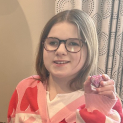The use of hematopoietic stem and progenitor cells to reverse treatment resistance to PD-1 blockade

Harnessing the immune system for the treatment of cancer through PD-1 checkpoint inhibitor has shown considerable promise in a number of solid tumors. However, outcomes remain poor for brain tumor patients. Since brain tumors are the number one cause of cancer-related deaths in children, finding ways to overcome treatment resistance in this population is paramount. Our group has found a novel way to defeat treatment failures to PD-1 monotherapy by employing concomitant transfer of bone marrow-derived hematopoietic stem and progenitor cells (HSC) with PD-1 checkpoint inhibition in preclinical models of CNS malignancies. We have demonstrated that HSCs co-transferred with immunotherapy significantly increases accumulation and significant activation of tumor-reactive T cells and tumor-associated dendritic cells (DC) within malignant glioma and medulloblastoma. We have recently published that HSC + αPD-1 overcomes treatment resistance to αPD-1 in both f high grade glioma and cerebellar medulloblastoma which are tumors with distinct genetic backgrounds and anatomic location. We believe that this therapy has unifying mechanisms that transcends the differences in the types of malignant brain tumors and their anatomical location in these orthotopic models.
Project Goal
The major impact of our study is that we have discovered a clinically applicable method of overcoming treatment resistance to αPD-1 in multiple refractory brain tumors. Importantly, we believe that combinatorial HSC + αPD-1 dramatically reduces modulatory pathways within brain tumors while displacing endogenous suppressor cells. This leads to the observed subsequent increases in anti-tumor T cell activation within the tumor microenvironment. The characterization and development of a singular intravenously-delivered immunotherapeutic that can target multiple immune regulatory pathways within several distinct brain tumors is highly significant and clinically relevant.

